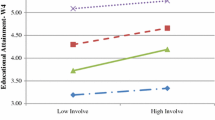Abstract
The changing positions of different members of adolescent support networks are examined with respect to adolescent age (11–15) and sex, and, in particular, with respect to changes following parental separation. Older children’s reports of less parental support are consistent with expectations of diminishing attachment. However, the relative importance of same sex friends for provision of support for girls, in comparison to boys, suggests more flexibility in the sense of their being less tied to parents for support. The comparison between children from different family types revealed no differences in respect of relations with same sex or opposite sex friends. Hence, no compensation or spill over from parental separation was evident. However, there was a clear system effect in that children from divorcing families that lived with their mother provided relatively more support for mother, and also reported less acceptance from their fathers in comparison to those children where no parental separation had taken place. Their adjustment will depend, at least in part, on the functioning of their broader social networks.
Résumé
Les changements dans les réseaux d’aide des adolescents sont étudiés en fonction de l’âge et du sexe des adolescents et, en particulier, les changements consécutifs à la séparation des parents. Les témoignages de manque d’aide parental des enfants les plus âgés vont de pair avec des attentes de diminution d’attachement. Par comparaison avec les garçons, l’importance de l’aide recherchée chez les amis de même sexe indique cependant davantage de flexibilité chez les filles, dans a mesure où elles sont moins dépendantes de l’aide des parents. Les comparaisons entre enfants de différents types de familles ne révèlent pas de différence en ce qui concerne les relations avec les amis de même sexe ou de sexe opposé. De même on n’a pas observé d’influence évidente de la séparation parentale. Cependant, on a observé un effet net áu système familial dans la mesure où les enfants de familles divorcées vivant avec leur mère fournissent relativement plus de soutien à leur mère, et mentionnent également moins d’acceptation de leur père, si on les compare aux enfants de familles non séparées. Leur adaptation dépend, au moins en partie, du fonctionnement des soutiens sociaux plus larges dont ils bénéficient.
Similar content being viewed by others
References
Bosma, H., & Jackson, S. (Eds.) (1990).Coping and Self-Concept in Adolescence. Berlin: Springer Verlag.
Brody, G., & Forehand, R. (1990). Interparental conflict, relationship with the noncustodial father, and adolescent post-divorce adjustment.Journal of Applied Developmental Psychology, 11, 139–147.
Bronstein, P., Frankel-Stoll, M., Clauson, J., Abrams, C.L., & Briones, M. (1994). Fathering after separation or divorce: Factors Predicting Children’s Adjustment.Family Relations, 43, 469–479.
Buchanan, C.M., Maccoby, E.E., & Dornbusch, S.M. (1991). Caught between parents: Adolescents’ experience in divorced homes.Child Development, 62, 1008–1030.
Cox, M.J., & Paley, B. (1997). Families as systems.Annual Review of Psychology, 48, 243–267.
Davies, P.T., & Cummings, E.M. (1994). Marital conflict and child adjustment: An emotional security hypothesis.Psychological Bulletin, 116, 387–411.
Dunlop, R., & Burns, A. (1988).Don’t feel the world is caving in. Melborne: The Australian Institute of Family Studies.
Emery, R.E., & Dillon, P. (1994). Conceptualizing the divorce process: Renegotiating boundaires of intimacy and power in the divorced family system.Family Relations, 43, 374–379.
Erel, O., & Burman, B. (1995). Inter-relatedness of marital relations and parent-child relations: A meta-analytic review.Psychological Bulletin, 118, 108–132.
Furman, W., & Bhurmester, D. (1992). Age and sex differences in perception of networks of personal relationships.Child Development, 63, 103–115.
Grotevant, H.D., & Cooper, C.R. (1985). Patterns of interaction in family relationships and the development of identity exploration in adolescence.Child Development, 56, 415–428.
Hetherington, E.M. (1989). Coping with family transitions: Winners, losers, and survivors.Child Development, 60, 1–14.
Hetherington, E.M., Hagan, M.S., & Anderson, E.R. (1989). Marital transitions: A child’s perspective.American Psychologist, 44, 303–312.
Honess, T.M., Charman, E.A., Zani, B., Cicognani, E., Xerri, M.L., Jackson, A.E., & Bosma, H.A. (1997). Conflict between parents and adolescents: Variation by family constitution.British Journal of Developmental Psychology, 15, 367–385.
Karney, B.R., & Bradbury, T.N. (1995). The longitudinal course of marital quality and stability: A review of theory, methods and research.Psychological Bulletin, 118, 3–34.
Lazarus, R.S., & Folkman, S. (1984).Stress, Appraisal and Coping. New York: Springer.
Lazarus, R.S., & Launier, R. (1978). Stress-related transactions between person and environment. In L.A. Pervin & M. Lewis (Eds.),Perspectives in Interactional Psychology (pp. 287–327). New York: Plenum.
Paikoff, R.L., & Brooks-Gunn, J. (1991). Do parent-child relationships change during puberty?Psychological Bulletin, 110, 47–66.
Rolland, J.S. (1990). Anticipatory loss: A family systems developmental framework.Family Process, 29, 229–244.
Sandler, I.N., Tem, J.Y., & West, S.G. (1994). Coping, Stress, and the Psychological Symptoms of Children of Divorce: A Cross-sectional and Longitudinal Study.Child Development, 65, 1744–1763.
Smetana, J.G., Yau, J., & Hanson, S. (1991). Conflict resolution in families with adolescents.Journal of Research on Adolescence, 1, 189–206.
Steinberg, L.D. (1989). Pubertal maturation and parent-adolescent distance: An evolutionary perspective. In G.R. Adams, R. Montemayor, & T.P. Gullota (Eds.),Biology of adolescent behavior and development (pp. 71–97). Sage: Newbury Park, C.A.
Taylor, R.D., Casten, R., & Flickinger, S.M. (1993). Influence of kinship social support on the parenting experiences and psychosocial adjustment of African-American adolescents.Developmental Psychology, 29, 382–388.
Vaux, A. (1985). Variations in social support associated with gender, ethnicity and age.Journal of Social Issues, 41, 89–110.
Westerman, M.A. (1987). Triangulation, marital discord and child behaviour problems.Journal of Social & Personal Relationships, 4, 87–106.
Youniss, J., & Smollar, J. (1985).Adolescent relations with mothers, fathers and friends. London: University of Chicago Press Ltd.
Author information
Authors and Affiliations
Additional information
The support of the Economic and Social Research Council (grant n° R000233054) for aspects of this work is gratefully acknowledged.
Rights and permissions
About this article
Cite this article
Honess, T.M., Charman, E.A. Adolescent adjustment, social systems and parental separation. Eur J Psychol Educ 13, 557–567 (1998). https://doi.org/10.1007/BF03173105
Received:
Issue Date:
DOI: https://doi.org/10.1007/BF03173105




